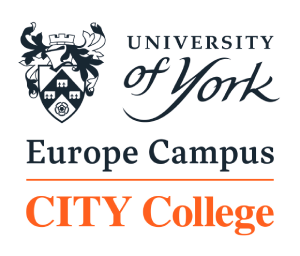News

The English Studies Department encounters Margaret Atwood
The new academic year finds us resuming classes in a familiar and yet altered reality due to the Covid-19 pandemic. The Personal and Professional Development Seminar series offered by the English Studies Department similarly resumed but in an online capacity. Launching the series in the Autumn 2020-21 semester on Tuesday, 20th October 2020, is Dr Filio Chasioti’s seminar titled: “It was dark inside the Wolf”: Margaret Atwood and her Worlds demonstrating not only an intriguing approach and insight to Atwood but also raising awareness towards this oscillating sense of the familiar and the ability to defamiliarize. As expected from any avid fan but even more so from an avid researcher, Dr Chasioti initially introduces and provides context to the author, Margaret Atwood, whom most of us probably know due to the TV series adaptation The Handmaid’s Tale (2017-). She establishes thematic areas that Atwood’s short stories and novels touch upon such as social realism, historical fiction, dystopian novels and – as Atwood has characterized them – ustopian novels. Drawing on Atwood’s MasterClass on writing, Dr Chasioti utilizes the phrase “It was dark inside the Wolf” not only to remind us of the well-known fairytale Little Red-Riding Hood but even more so to point out the different perspectives from which a story can be told that could defamiliarize us from what we already think we know. This element of focalization segues the topic towards the focus of the seminar, the MaddAddam trilogy (Oryx and Crake (2003); The Year of the Flood (2009); MaddAddam (2013); a series that delves into areas such as the ‘ethics’ of science, corporate exploitation of resources, exploitation of the environment and ‘ecological utopianism’, post-humanism, role of spirituality ultimately deeming the series a ‘coming-of-age’ story of the speculative dystopian/ustopian genre. Dr Chasioti highlights some prevailing features in the series, namely multiple focalizers, different narrators, intertexts and the significance of memory. What is noticeable, according to Dr Chasioti, is that at a narrative level, readers are constantly estranged through multiple viewpoints, different timelines, unreliable narration, quality of memories, while at a textual level Atwood presents some unique and intriguing elements the style and function of which permits her to make the story active. In other words, Dr Chasioti highlights the ability of the author to intertwine narrative and textual style to such a degree that makes the story mutable, makes the reading experience of it (and not solely the adaptation audio-visual experience) even more unique and invites one to consider if the dystopia evident in the novel series ( as well as in other stories Atwood has created) is indeed “only” dark or if there is, as Atwood tends to stress, light and hope in dystopias/ustopias. It is no secret that dystopian fiction and apocalyptic, or post-apocalyptic texts are trending or may be over-marketed. What is encouraging, though, is to see how certain authors, like Atwood, challenge us as readers to reconsider and re-evaluate not only the genre(s), the stories/narratives but also the textual components that reveal how they are told thus potentially revealing that ‘silver-lining’, that element of ustopia.
29/10/2020
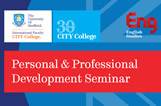
Personal & Professional Development Webinars 2020 by our English Studies Dept.
October - November - December 2020 Join and share! Online Participation Form Join the Webinar Ready to join? - Join via your mobile device, laptop or PC - Enter the event 10' earlier by clicking on the 'Join' button (you will be requested to enter your email to join in) - Make sure that you have your camera and microphone turned off - Make sure you PIN the presenter's image so you can have a full screen view. Join the Webinar
13/10/2020
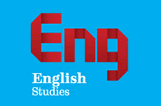
The Public Engagement Scheme of the English Studies Department
We all believe that teaching is a noble profession that makes all other professions possible! To ensure future opportunities of education in these hard times, a generous volunteer-mentality is integral to social equality and advancement. It is this mentality of an outward-facing ethos that caters to informed citizenry, offering back to society and raising awareness which prompted the launch of a noteworthy programme. The English Studies Department in collaboration with the Municipality of Thessaloniki, launched its Public Engagement Scheme titled: “Supporting Financially Weak Families of Thessaloniki: English Language Lessons for Teenagers” in 2016. It has since seen a successful run up until the present day. The Public Engagement Scheme serves a twofold aim. Firstly, it provides teenage students with the opportunity to improve their level of English and acquire the B2 certificate within a period of three years. Secondly, the initiative gives Level 3 students of the English Studies Department the opportunity to do their teaching practice in real-classroom conditions under the supervision of Dr Vicky Papachristou and Dr Cathy Marazi. More importantly, the scheme aims to raise awareness towards the need to overcome stereotypes and ensure equal and fair treatment to all. We would like to thank all our students and staff for offering their knowledge, skills and time as well as Express Publishing for supporting this cause every year by donating the coursebooks to students and teachers.
06/10/2020

Practical seminar on CV making and interview preparation for the English Studies Department
The Director of Career, Employability & Enterprise Centre offered an online seminar on CV making and interview preparation to the students of the English Studies Department. Mr Tsoulis gave tips on creating a succesful CV, what to include and what not. Also, the value of skills was discussed and how young people can work toward improving existing skills and developing new ones. Also, Mr Tsoulis shared advice and tips on how best to prepare for and handle an interview. There was vivid participation and lots of interesting questions on behalf of the students. The transition from offline to online is definitely successful and productive. The Career office delivers all its services online now and more seminars like this will follow.
30/03/2020
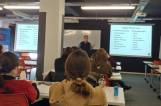
The English Studies Department Comparatively Considers the Case of the Translatable Cat
The first Personal and Professional Development Seminar of the Spring semester that was organised on Tuesday, 3rd March by the English Studies Department, began on a whimsical note by considering the translation of certain animal figures and their names in literature. Drawing on the areas of comparative literature, children’s literature, and literary animal studies our guest speaker, Dr. Panagiotis Xouplidis, in his seminar titled: "The comparative cat and how to translate it - A case of Literary Animal Studies" focused specifically on the case of the cat and how to translate it. Dr Xouplidis initially provided an overview of what constitutes comparative literature and how it is seen today. Drawing on concepts and dichotomies such as national/international, local/global, colonial/post-colonial/imperialistic, today comparative literature can be seen and understood as political ideologies but also literary systems that act as parts of universal systems thus indicating that these systems are not in isolation but part of a polysystem and to see them as such is integral when it comes to matters of translation. The matter of similarities and differences in literary systems may appear easy to identify and examine when it comes to children’s literature which has a tendency to rely on stereotypes or archetypes and what some may view as simplistic representations and stories. Nevertheless, these stories enrich national, and international, identities and can have a great impact on how cultures perceive themselves and others. One common feature across children’s literature is that of the animal – or non-human animal – figure and it is this figure that has led some scholars to consult the area of Animal Studies for theoretical and scientific support in their research examinations. Animal Studies is an area that requires an interdisciplinary approach and can extend from elements of biology to sociocultural and anthropological aspects of animals in and across cultures. What is certain is that in literature animals are inventions/constructs whose representation speaks miles of a country’s culture. When considering the figure of the cat, for example, Dr Xouplidis makes the case for a Greek Cat and a Spanish Cat. While in both cases we have a cat, they are not in fact cats – but literary inventions – and where they are created, how they are conceived and what they are meant to represent and reflect ought to be considered when the need for translation arises. To indicate this significance, Dr Xouplidis draws on the example of Eugene Trivizas’ The Last Black Cat (2001) and its Spanish translation. Providing a list of cat character names, Dr Xouplidis invited the audience to contemplate the aspects that should be considered when the respective names are to be translated and how the anthropomorphic dimensions of these characters can even play a role in the name assigned. Yet another well-known example that was introduced was that of Puss in Boots in comparison with the figure of Zorro. This was further extended to consider the meaning of Zorro in Spanish (which means fox) and how the translation and consideration of certain animal figures may be dealt with through other concepts, such as that of the trickster in this particular case, thus alluding to mythologies and fables. What we need to remember is that animals are as old as literature. Characters such as Puss in Boots and the Cheshire Cat are literary animals created by words in different languages. Following Dr Xouplidis seminar, it becomes apparent that the examination of such characters either with an eye towards translation or with a focus on literary systems can certainly benefit from an intersection of comparative literature and animal studies when contemplating the cat’s literary representation and how translating cat names could play a fundamental role in a cat characters’ reception.
04/03/2020
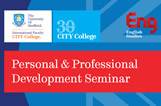
Personal & Professional Development Seminars 2020 by our English Studies Dept.
March - April - May 2020 EVENTS CANCELLATION Please be informed that the event on 17 March will be cancelled. FREE ADMISSION Join and share! Online Participation Form
24/02/2020
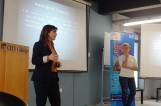
The English Studies Department Subverts Genres
The final Personal and Professional Development seminar of the Autumn semester that took place on Tuesday, 10th December combined the areas of literature, translation and adaptation under the umbrella area of genres and their subversion. Joining forces, Dr. Cathy Marazi and Dr. Kelly Pasmatzi, delivered the seminar titled: ‘Subvert me if you can’: literary genres and going against expectations. We are all familiar with genres in one way or another. We may rely on genres – types or kinds – of literature, film, TV series, videogames to choose what we will read, watch or play. The main reason for this is because genres contain certain formulae or motifs that have been developed and refined over the years that enable us to expect certain things from certain genres. When reading a fairy tale, we expect there to be a happy ending; when watching a horror movie, we expect to be shocked and scared. Genres, however, are not as clear-cut as they may appear. There are numerous instances of hybrid genres, such as that of the superhero, as well as sub-genres such as the black comedy, that blend, alter and change certain expectations. What is more, one must be aware that a romance novel and a romantic film are not exactly the same genre due to change in medium. Furthermore, one ought not overlook how genres are used and employed so as to distinguish and in some cases dictate the formulation of canons as well as situate literary and cultural products into the high-literature or low (pop) literature categories thus determining what is taught in schools and universities. As pointed out, it is also important to see what is missing from genre categories. The focus of the seminar in question was to raise awareness towards instances where writers choose to go against and challenge genre expectations and conventions. This may be due to the purpose of the writer when catering to larger mainstream audiences such as in the case of film adaptations, or due to changes in society such as the case with feminist movements and gender representation. The examples drawn upon were numerous including: Thelma and Louise (1991), The Dark Knight (2008), Reservoir Dogs (1995), Scream (1996), La La Land (2016), Brokeback Mountain (2005), Clockwork Orange (1971), Joker (2019), Bridget Jones’ Diary (2001) and Pride and Prejudice (1813), Breakfast at Tiffany’s (book 1958 and film 1961), Captain Corelli’s Mandolin (book 1994 and film 2001), reference to the Brothers Grimm fairy tales, as well as other versions of these fairy tales (British versions). Subverting genre calls into question stereotypes, dominant ideologies and perspectives that may be promoted as the status quo. To that effect, Dr Pasmatzi and Dr Marazi called on the attendees of the seminar to consider and subvert one of the earliest types of literature we are all exposed to that of the fairy tale. Taking one of the most familiar fairy tales, that of Cinderella, the members of the audience were asked to work in groups and subvert any aspect they chose. The results were highly creative, humourous but also demonstrated serious sociological and ideological issues that we ought not take at face value but approach critically and reconsider from other perspective especially as all literature can and does promote ideological meanings and can greatly influence how we view the world around us and the people living in it.
16/12/2019
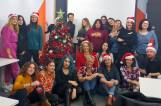
Christmas Party by our English Studies Department
Keeping its tradition, the English Studies Department spread the Christmas spirit with a joyous Christmas Party that took place 3, December 2019 at our main campus in Thessaloniki with students and staff exchanging wishes and having fun over Christmas homemade delicacies. Enjoy reading a reappropriation of the poem "Twas the Night Before Christmas" that Dr Cathy Marazi put together, inspired by the festive day! Enjoy Season Delight ‘Twas the English Studies Department annual party before X-mas, when all through the premises, not a student was stirring, not even in the entrances; Two stockings to hang but on what chimney oh where, Yet all in hopes that St. Nick soon would be there; Suddenly, pupils appear going to class, after a long break, so well fed, While visions of candy-cane coffee breaks continue to fill their head; And lecturers on alert for anything asap, Proceeded to their lesson recap; When from the Multi-purpose room arose such a clatter, Some sprang from their seats to see what was the matter; ESD students darting back n’ forth in a flash, Commencing their X-mas festivities with joy and panache; Eyes and twinkle lights were lit aglow The only thing missing uh mistletoe, When, what to their wondering minds should appear, But tree-trimmings, emoji carols, games, gifts and pictures, dear; With enthralled youth, so lively and quick, ESD staff must stay on their toes with more than a party trick. And though there was not time for a spelling-bee game, We all had fun just the same. Now students and staff this poem may be influenced by fiction, But at this time of the year that kind of holiday spirit kicks in. From students to teachers, lest we need a roll-call, We all crave joy and cheer on the holidays y’all. As dry leaves in the fierce wind fly, So too we await the holiday break with a sigh, So buckle up, only a few weeks before we bid you adieu, Yes, we know students you’ll miss us, we will too. But these parties are proof, That sometimes we can make time to be a little aloof. So while obligations and deadlines may be comin’ round, Do not despair, soon you will feel content and sound. Dressed in your party clothes from head to foot, With no reason to stay put, The New Year is approaching so why look back, Unless it’s to set resolutions for a new track. Now is the time to be thankful, jolly and merry, With Jack-Frost nipped cheeks rosy like a cherry. As you wrap up the presents tightening the bow, And maybe secretly singing Let it snow? Caroling or shopping in this cold, can we avoid clenching our teeth, But it is necessary to get provisions like tinsel and don’t forget the wreath; Come that holiday family dinner that fills the belly, We’ll all laugh, sigh, and drift asleep in front of the telly. But now is also the time when one does not just think of oneself, Now is also the time to bring happiness to others, kinda like a Santa elf. So help the joy spread, Yes, there are still those who have no food, clothes, even a bed. And if some of you may not be carefree but still have to work, Do not fret, do not pout, please do not go berserk. You will have time to rest your weary toes, And have fun whilst taking memorable photos. But before school’s out at the sound of the whistle, And you all commence your festivities (fo’shizzle). We exclaim that you Enjoy Season Delight, Merry X-mas, Happy Hanukkah, Joyous Kwanza from all of the ESD, We now bid you goodnight!
06/12/2019
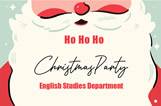
Christmas Party at the English Studies Department
27/11/2019
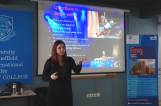
The English Studies Department Experiences Theatre Monologue Creative Writing
The English Studies Department’s third Personal and Professional Development Seminar held on Tuesday, 19th November marks an exciting exposition into the area of creative writing. Our guest speaker, Ms Despoina Kalaitzidou, drama facilitator, playwright and director, delivered an interactive and insightful seminar/workshop titled: “Are you talking to me?: An Introduction to theatre monologue writing. And while the title of the seminar may prompt some of us cinephiles to think of Martin Scorsese’s Taxi Driver (1976), theatre monologues – or soliloquies – as well as poetry, can be a good starting point for creative writing. As Ms Kalaitzidou informs, being a theatrical genre and play unto itself, a monologue can include one or multiple actors who do not directly talk to each other but could tell a story from different perspectives; it may or may not contain conventional dialogue, there is no fourth wall – usually the actor addresses the audience directly or talks to an invisible character/auditor. Finally, it could be a solo performance, even autobiographical. Questions to begin with are usually: who is my character, where is my character, how is the setting, what are the main points in my monologue, to whom am I or the character talking, is the monologue realistic/absurdist/a mixture/something different? And even if we think of these before writing, they may change as we are writing. Ms Kalaitzidou shared some of her personal experience and insights stating that events in our life may inspire us, other works of art and literature, current events, even more collective elements such as mythology. The important thing to remember when writing – in addition to actually writing – is to be truthful, real and authentic, to have a reason to write and to have a purpose. Some find workshops such as the seminar in question to be helpful in those first creative steps. Some require a bit of prompting – such as a well-known myth, possible characters and even phrases which they can then complete and go back and edit. Ms Kalaitzidou in the context of this workshop urged all members of the audience to write and those willing shared their monologues which Ms Kalaitzidou then performed. Reflection of the experience followed as well as key concerns about how to get into creative writing, how to get one’s writing out there, and the value of feedback. As with any venture, Ms Kalaitzidou emphasizes that it requires us to be bold, take risks and be persistent if it is something we truly desire.
21/11/2019
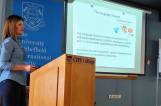
The English Studies Department Acknowledges Alternative Assessment Forms
The English Studies Department of CITY College is highly aware that assessment is a great and important part of education at all levels. The second Personal and Professional Development Seminar delivered on Tuesday, 5 November, 2019 touches upon this issue. Our guest speaker, Dr Ifigenia Kofou, through her seminar titled: “Alternative Language Assessment Forms” raises our awareness towards the importance of assessment and the alternative forms it can take. When we hear assessment our minds immediately go to items like tests, exams, grades. Alternative assessment as Dr. Kofou highlights also incorporates reflection: how do we assess, why do we assess and what do we assess? Alternative types of assessment include: portfolios, journals/diaries, think-aloud protocols, project-based learning and rubrics. Given the learner-centered context that is becoming ever more prevalent in teaching/learning practices, both teachers and learners need to learn or become more aware of reflecting on practices as well as assessment in comparison to their prior or past knowledge, skills and abilities. Alternative forms of assessment can certainly assist as a continuous informal procedure that enhances cooperative learning, engages and motivates students towards active participation, teaches them life-skills and enables them to become more autonomous. Dr. Kofou in the area of portfolios placed added focus on the European Language Portfolio that consists of a Language Biography (where learners can exhibit any/all languages they know and/or are learning), a Dossier (containing student work thus demonstrating competences/achievements) and their Language Passport. In addition, journals or diaries – as they draw on actual everyday practices and are thus considered the most common type of alternative and reflective assessment – come in various types such as dialogue journals, learning journals, diaries of attitudes/feelings and can be used by both students and teachers. The Think-Aloud protocols as Dr. Kofou informs can assist students in understanding and becoming more aware of what they are learning, where they have difficulties and what these difficulties are as well as how they can solve these problems. Students essentially become more aware of how they are learning. Projects can pose as a more dynamic approach and contribute towards collaborative teaching across disciplines. As with all types of assessment so too all the aforementioned need to align with goals, Learning Outcomes, clear instructions and criteria of assessment as well as reflection for future adjustments and improvement. In other words as Dr Kofou stresses, alternative assessment does not exclude testing but actually requires the implementation of testing so as to validate alternative assessment forms and by extension prove that they are reliable. Hence, Rubrics are also a valuable component not only in informing students of what they are being assessed on and how but also to enable teachers to provide descriptive assessment and productive feedback as well as help students and themselves to engage more in reflective learning/teaching practices. By extension there are different types of rubrics such as: critical thinking, analytical, general, task-specific, etc. Overall, Dr Kofou points out that alternative assessment by being sensitive towards students’ backgrounds, skills, strengths and weaknesses allows through personalized profiles and diverse tools and practices for a richer and more varied way to assess our students but also ourselves, our strategies and our materials. Assessment reform should be, in other words, an ongoing, continuous effort.
07/11/2019
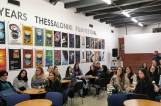
English Studies Department students go to the Thessaloniki International Film Festival
On Monday, November 4, Level 1 and Level 2 students of the English Studies Department had their session for the Introduction to Film Studies unit at the premises of the Thessaloniki International Film Festival. Following an initiative by their lecturer, Dr. Thomas Mantzaris, the students were introduced to the inner workings of the festival by the Head of the Agora department, Ms Yianna Sarri, who provided valuable insights into the industry. Students not only deepened their knowledge of the film industry by familiarizing themselves with the context and operations of the 60th Thessaloniki International Film Festival, but also managed to relate class discussions on film production, distribution, and exhibition to one of the most significant cultural events that takes place in Thessaloniki every November. Ms Yianna Sarri exposed students to the professional side of the festival, highlighting the challenges of filmmaking in the twenty-first century as well as underlining the festival’s commitment to encourage young filmmakers and bring them to the forefront. Students took advantage of this unique opportunity in order to address questions, and enhance their overall understanding of the film industry.
05/11/2019
  4 from 13 4 from 13   |
